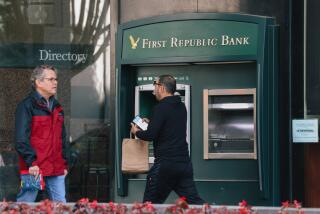Wall Expects Many Banks to Acquire Thrifts
- Share via
NEW YORK — The chairman of the Federal Home Loan Bank Board said Wednesday that he expects many banks to acquire thrifts under the government’s savings industry rescue plan but that he doesn’t believe the program signals the death of the industry.
M. Danny Wall also told a meeting of international bankers that the government actively would seek restitution from fraudulent thrift barons, whose actions have contributed to the industry’s losses, said to be accruing at $500 million a month.
He said the $90-billion bailout plan announced this week by President Bush does not signal the demise of a financial institution created in the 1930s to help Americans buy single-family homes.
“Over time, I’m convinced we should allow those kinds of institutions to borrow from federal home loan banks,” he said. “You have to understand in this country we have had a very high commitment to home ownership.”
Wall said he supported Bush’s proposals, which include abolishing the three-member Federal Home Loan Bank Board that regulates the nation’s 3,100 thrifts. The bank board’s regulatory apparatus would be placed under the supervision of the Treasury Department.
The plan also would place the insolvent Federal Savings and Loan Insurance Corp., which insures thrift deposits, under authority of the Federal Deposit Insurance Corp., which insures deposits at commercial banks and regulates the 8,000 state-chartered banks.
Wall said the plan for dealing with hundreds of troubled thrifts includes reversal of a Federal Reserve ban on allowing bank holding companies to own thrifts, which traditionally have catered to individual depositors or mortgage seekers.
Under the plan, which must be approved by Congress, banks would be allowed to absorb insolvent thrifts immediately and acquire healthy institutions beginning in 1991.
“We are overruling the Fed, legally,” Wall said, adding that he expected banks to enter the thrift industry as soon as they are allowed to.
Wall told a meeting of the Institute of International Bankers that the expected infusion of investment from banks would invigorate and perhaps save the thrift industry.
One possible result of the plan is the eventual merger of the banking and savings and loan industries. Savings institutions have lower capital requirements than banks, a practice that would be modified under the government plan.
Wall also pledged to crack down on thrift institution fraud, and cited a $50-million infusion of money under the Bush plan to beef up federal prosecution of such crime.
More to Read
Inside the business of entertainment
The Wide Shot brings you news, analysis and insights on everything from streaming wars to production — and what it all means for the future.
You may occasionally receive promotional content from the Los Angeles Times.










